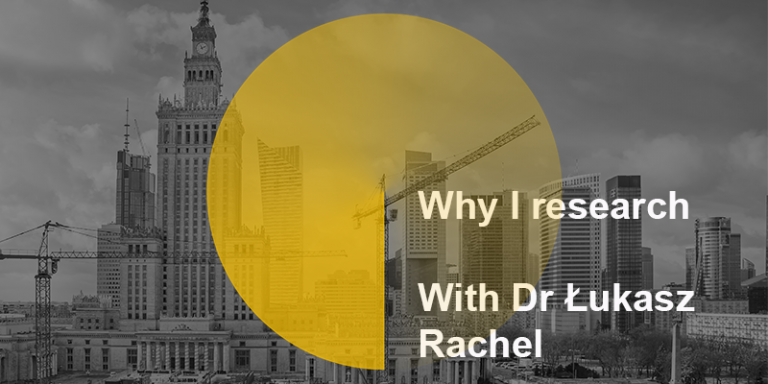Understanding the impacts of a changing economy
3 November 2022
We spoke to Lukasz Rachel about how his early life shaped his interest in understanding how major shifts in the economy affected individual families and communities.

Where did it all begin?
Growing up in Poland’s industrial heartland in the 1990s, I have witnessed some of the most extreme socioeconomic changes imaginable – those of a country that transforms itself from a centrally-planned economy into a free market economy, essentially overnight. The transition was neither pretty nor smooth: the early 90s saw periodic hyperinflation and mass unemployment. Of course, back then, I was too young to understand or consciously think through any of this, but I’d like to think that living through such vast changes and severe dislocations ignited an interest in how the economic system works. In particular, I became interested in what features make certain socioeconomic setups successful in the long run by creating opportunities and raising the well-being of all so that the social fabric and economic progress reinforce each other. At some broad level, these are still the questions I pursue in my research today.
Who inspired you?
I have been very lucky to have come across many inspiring individuals, including my family and friends. In my family home, policy issues were always hotly debated. When I moved to the UK, I found myself surrounded by friends who were incredibly devoted to their work and research while drawing much enjoyment from it. Seeing their passion for what they do and believe in was certainly an inspiration. During my studies, my classmates always pushed each other to do better and strived to learn from each other. Last but importantly, the professors of economics that I have collaborated with most closely so far prove to be a constant inspiration, particularly in how they apply rigorous analytical thinking to pressing policy questions.
What’s the big idea?
My research is trying to understand better the impact that structural shifts in the economy – predominantly but not exclusively to do with technological change – have on the aggregate well-being of nations as well as distributional consequences within economies. Specific examples include the rise of products that are available to consumers at zero prices and are instead monetized through capturing peoples’ time and attention or the shift towards automation: replacing human labour with machines in carrying out tasks in the economy. The big idea is that understanding the fundamental drivers of medium-term developments helps us devise better policies for the benefit of all.
What should we be reading?
There is way too much great stuff out there that we should be reading and too little time! My “to read” list is certainly growing, in any case. But let me be very specific: in terms of academic writing, Chad Jones’s papers on long-run economic growth are always fascinating and informative. As far as journalism is concerned, Martin Sandbu, the FT’s European Economics Commentator, never fails to provide an interesting perspective on the macroeconomic policy landscape.
What policy changes would you like to see in your area of expertise?
There should be tighter anti-trust regulation in the area of services provided for free (often missed by the traditional anti-trust approach that focuses on pricing power). And there should be significant increases in public investment and social insurance, with particular emphasis on continuing education and adaptation to the ever-changing labour market, financed by higher taxation at the very top (including closing the loopholes and limiting the possibility of tax evasion).
What’s the big question?
How to exploit the gains brought about by technological change while minimizing the disruption and uncertainty associated with it?
What’s the answer?
Patiently invest in peoples’ skill and in infrastructure, broadly defined.
Who or what gives you hope?
Two things: first, it never ceases to surprise me how the world is so full of incredibly smart people. Second, and relatedly, miracles happen – look, for example, at the price of renewable energy over time, which has rapidly decreased over the last decade.
You've had a very proactive role in several working groups that aim to coordinate the response of economists to the War in Ukraine. Could you tell us about this work?
Economics plays an incredibly important part in the response of the West to Putin’s horrific war: absent direct military involvement, it is the economic pressure that aims to limit Putin’s resources (and hence his ability, if not incentives) to wage war in Europe. Economists are well equipped to analyze the trade-offs associated with sanctions and dispel myths that are sometimes present in the political debate. I would particularly recommend following the outputs of the Yermak/McFaul International Working Group on Sanctions, of which I am a member. The interdisciplinary nature of the group and its unparalleled level of expertise across all the different dimensions of the response to this brutal conflict make it a worthy and influential voice in the debate.
How can researchers communicate their ideas effectively to the public during moments of crisis like the War in Ukraine and the attendant cost-of-living crisis?
I believe it is important to use multiple and complementary communication channels. Social media is one such channel. It allows researchers to spread ideas and exchange views with other researchers and with journalists. These ideas can then be picked up by journalists who transmit the message into the public discourse. In the process, other channels often open up – interviews to the media, participation in panel discussions, webinars, and podcasts further amplify the message. Clarity of communication is obviously important, as is being able to ‘’hook’’ or “anchor” the research results to the ongoing events and debate.
Dr Lukasz Rachel, Lecturer in Economics
 Close
Close

